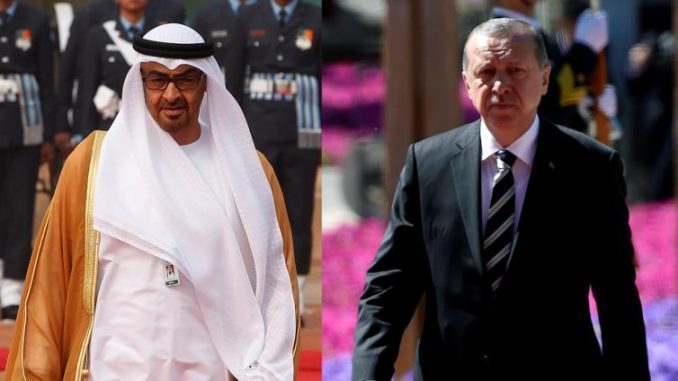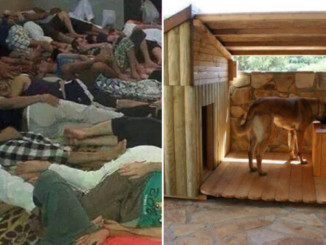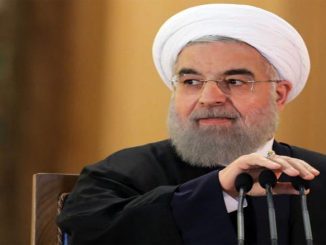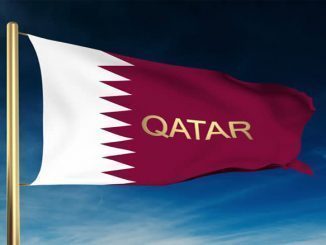
UAE embassy now sits on corner of Fahreddin Pasa Street, as UAE and Turkey squabble over record of former Ottoman governor of Medina
For years the embassy of the United Arab Emirates in Ankara was located on the corner of 613 Street and 609 Avenue in the Turkish capital. As of Tuesday the embassy has a different address that is unlikely to please the UAE’s foreign minister.
Ankara’s council on Monday evening ratified a motion to rename them Fahreddin Pasa Street and Defender of Medina Avenue.
It is the latest development in a row that erupted in December after the UAE’s foreign minister, Abdullah bin Zayed al-Nahyan, retweeted a post denigrating Fahreddin Pasa, a World War One-era Ottoman commander tasked with the defence of the Muslim holy city of Medina.
The post alleged that Fahreddin Pasa, who was governor of Medina from 1916 to 1918 until he was forced to retreat under a British-backed Arab assault, stole the city’s treasures and had committed crimes against local Arabs.
The Twitter post also took aim at Turkish President Recep Tayyip Erdogan.
“These are Erdogan’s ancestors and their past with the Arabs,” the tweet said.
The post and Abdullah’s retweet came after Erdogan’s attempt to portray himself as a leader of the Muslim world in the wake of US President Donald Trump’s decision to recognise Jerusalem as the capital of Israel in December.
Erdogan wasted little time in hitting back at the UAE.
“Where were your ancestors you sad ones that slander us today while Fahreddin Pasa was defending Medina?” he said in a speech on 20 December.
Turkish-UAE ties have been strained since Egypt’s Mohamed Morsi became the country’s first democratically elected president in 2012.
Ankara backed the Morsi government, saying the democratic wishes of Egyptians had to be respected. Abu Dhabi sought Morsi’s removal, citing his membership of the Muslim Brotherhood, which the UAE considers as a threat to its rule and deems to be a “terrorist” entity.
Deep undercurrents have strained ties between the two countries ever since without erupting into open enmity.
Turkish media close to the ruling circle have on many occasions suggested UAE involvement in various anti-Turkish activities, including the $3bn funding of the 2016 coup attempt in Turkey.
Ankara and Abu Dhabi found themselves at odds again last June when Saudi Arabia imposed a blockade on Qatar. The UAE was firmly aligned with the Saudis, whereas Turkey, along with Iran, opted to send food and other supplies to prevent Doha from being completely isolated.
The UAE ambassador to Ankara has not been in his post since 2014 despite there being no official recall or downgrading of ties.
Street name diplomacy
Officials in Ankara appear to have drawn inspiration from the playbook of Tehran when it comes to street name diplomatic niceties.
A street in Tehran was named in honour of Khalid Islambouli, the assassin of Egyptian president Anwar Sadat in 1981. It was only in 2004 that the Tehran municipality changed the name of the street after being urged to do so by the Iranian foreign ministry.
Tehran had cut off ties with Egypt following the 1979 installation of the theocracy in Iran in protest at Cairo’s part in the Camp David accord with Israel, and also for hosting the exiled shah of Iran.
In 1981, Iranian authorities also changed the name of a Tehran street where the British embassy is located from Winston Churchill Street to Bobby Sands Street, in homage to the IRA hunger striker.
The city of Medina houses the tomb of the Prophet Muhammad and is revered by Muslims. It was under Ottoman rule until Pasa’s surrender in 1919.
Items removed from Medina are housed in Istanbul’s Topkapi Palace Museum. In his speech on 20 December, Erdogan said Fahreddin Pasa had prevented the sacred relics from falling into the hands of the occupying forces.
The UAE consulate general in Istanbul remains at the same address.



